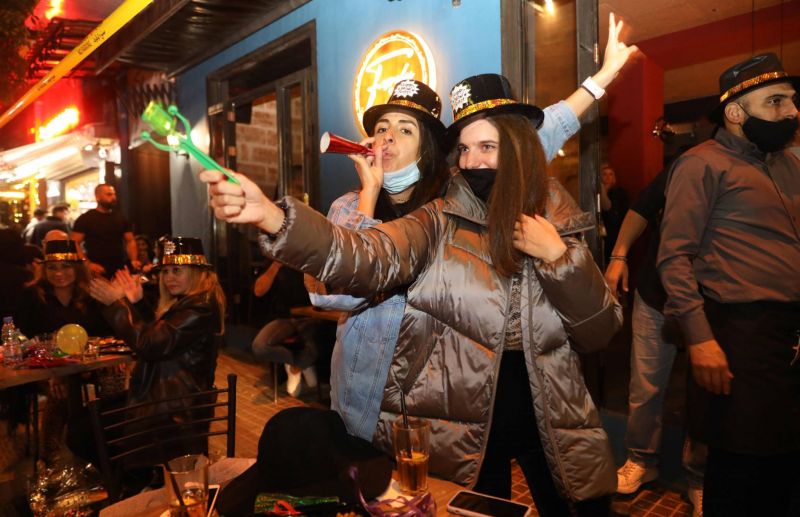
Revelers celebrate New Year's Eve at a pub in Beirut. (Credit: Anwar Amro/AFP)
For the third time in a row, Lebanon rang in the new year without a government. More than two months have passed since Saad Hariri was nominated to form a cabinet that would be tasked with pulling Lebanon out of economic collapse and embarking on a series of radical reforms. Pre-Christmas promises of a government failed to materialize, despite meetings between Hariri and President Michel Aoun, and there has been no progress since.
Hospitals in Beirut are operating at full capacity and are no longer able to accept COVID-19 patients. Ambulances are having to take patients requiring hospitalization outside the capital, a Health Ministry source told L’Orient Today. Rouba Hamdash, a nurse at the Abdullah Al Rassi Governmental Hospital in Halba, Akkar, said that the coronavirus intensive care unit there is now treating patients from across the country, describing additional pressure put on already exhausted health care workers as “draining.” Petra Khoury, an adviser to caretaker Prime Minister Hassan Diab, said the country’s ICUs were 90 percent full. Health officials, including Parliament’s health committee, have called for a new countrywide lockdown, but our sister publication L’Orient-Le Jour reports that authorities are likely to hold off until after Armenian Orthodox Christmas on Wednesday.
Last week saw two new records for daily cases of COVID-19, with 2,878 on Dec. 30 and 3,507 on New Year’s Eve. Videos posted to social media over the holiday weekend showed bars, nightclubs and events venues packed with people, many of whom were not wearing masks. In the days immediately before and after the New Year’s celebrations, people waited in hourslong lines outside hospitals to get tested for the virus. The full impact of festivities and gatherings may not become clear for at least another week, as the incubation period of the novel coronavirus, the time between exposure and symptoms developing, can be as long as 14 days.
A woman died in the early hours of New Year’s Day of injuries caused by celebratory gunfire. The woman, a Syrian refugee living in an informal settlement in Baalbeck, was hit in the head by a stray bullet around midnight on Jan. 1 and was taken to the hospital, but died of her injuries. A new Middle East Airlines airplane parked on the tarmac of the Beirut airport was smattered with small holes, also caused by bullets fired to mark the advent of 2021. The Internal Security Forces published the names of 34 people it had arrested for firing into the air. The practice of shooting weapons into the air to mark funerals, weddings and other celebrations remains a common practice, as the laws prohibiting it are not effectively enforced.
Ten people were injured last night in a gas tank explosion in the Hermel town of Al-Qasr, on the Lebanese-Syrian border. Georges Abou Moussa, Civil Defense’s head of operations, told L’Orient Today that the large explosion was the result of a fire that broke out in a warehouse storing gas bottles and diesel fuel, but said did not have information on how the fire broke out. In October, five people were killed in two separate fuel tank explosions in Beirut, prompting a campaign by the Beirut municipality to locate unsafely stored gas and diesel in the capital.
Former ministers Ali Hassan Khalil and Ghazi Zeaiter will not appear for questioning as scheduled before Judge Fadi Sawwan today as Lebanon’s top court has not yet issued a decision on the ministers’ appeal to have Sawwan removed from the case, a judicial source told L’Orient-Le Jour. Sawwan, the judge leading the investigation into the devastating explosion at Beirut’s port on Aug. 4, had suspended the process for 10 days following Zeaiter and Khalil’s request, in which they accused him of violating the constitution and having political motivations for charging them with “criminal negligence” in the case. The same source said late last week that Sawwan handed the entire file to the Court of Cassation to examine, but that the investigation would not move forward until the court, in a chamber headed by Judge Jamal al-Hajjar, made its decision.
Eight retired army officers are set to appear before a judge on Friday as part of a landmark corruption case. The officials, including former Lebanese Army head Jean Kahwaji, were charged last month with abusing their positions for financial gain — the first judicial proceedings pursued under the “illicit enrichment law” passed by Parliament in September. The hearings were originally scheduled for Dec. 11, but were postponed after Kahwaji and two other officers did not turn up.